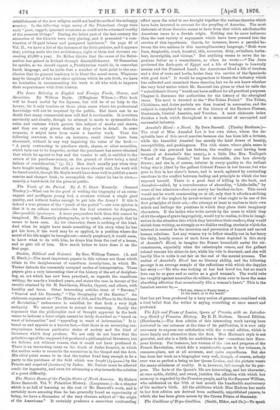Studies, Biblical and Oriental. By Rev. William Turner. (A. and
C. Black.)—The most important papers in this volume are those which relate to the decipherment of cuneiform inscriptions, in which Mr. Turner defends the commonly accepted modes of interpretation. These papers give a very interesting view of the history of the art of decipher- ing, an art which has now been practised, as regards the cuneiform writing, for nearly a hundred years, and states the ease in favour of the results attained by Sir H. Rawlinson, Hincks, Oppert, and others, with lucidity and force. Other interesting articles treat of " Berosus," "Nimrod and his Dynasty," "The Geography of the Exodus." An elaborate argument on "The History of Job, audits Place in the Scheme of Revelation," endeavours to establish for that book a very high antiquity. We cannot profess to accept its reasoning. Surely the argument that the philosophic cast of thought apparent in the book seems to indicate a later origin cannot be fairly described as "based on want of information" and "appealing to want of information." It is based on and appeals to a known fact,—that there is an unvarying cor- respondence between particular states of society and the kind of literature which they produce. We not only do not know that the primitive age of the supposed Job produced a philosophical literature, but we believe, not without reason, that it could not have produced it. There is an interesting essay on the death of Judas Iscariot, in which the author seeks to reconcile the narratives in the Gospel and the Acts. His chief point seems to be that the traitor lived long enough to be a party to the purchase of the field which was bought (iryepeeesp) by the Priests and acquired (iargifiere) by Judas. Mr. Turner must be allowed credit for ingenuity, and even for advancing a step towards the solution of a great difficulty.


































 Previous page
Previous page